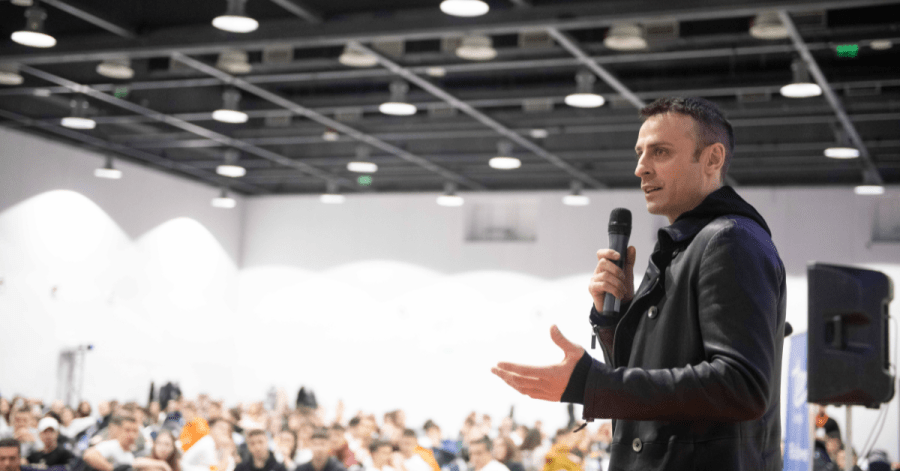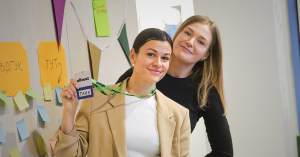Global football superstar Dimitar Berbatov, who has enjoyed success with top clubs such as Tottenham, Manchester United and Fulham, is known as a top scorer and fan favorite. His impact on the world of sports is immeasurable. But that’s just part of his story.
In addition to his pitch contribution, Berbatov is also a philanthropist and founder of the Dimitar Berbatov Foundation. The organization empowers children in Bulgaria by providing them with education, and cultural and sports opportunities, helping them create a brighter future for the next generation.
At the “Weekend of Ideas” event, which was put on by Teenovator, Dimitar Berbatov gave the opening keynote address as part of his commitment to helping brilliant young people. The Teenovator program is a year-round program designed to encourage high school students in Bulgaria to think like entrepreneurs and to create their own businesses. Over 500 students between the ages of 16 and 18 came together for the “Weekend of Ideas” from 30 towns across the nation. They had to collaborate in teams to first submit their startup concepts to a jury under the guidance of their business mentors.
Recognizing the unique opportunity to learn, network, and grow together, Berbatov advised the aspiring teenpreneurs to: “Never lose sight of the goal and allow your moral compass lead you in that direction”.
In this inspirational interview for The Recursive, Dimitar Berbatov shared his views on talent, entrepreneurship, and what it takes to succeed in sports, business, and life. He also discussed his goal of empowering young people to influence positive change in their own environment.
The Recursive: Mr. Berbatov, it is a pleasure to meet you. What motivated you to support Teenovator’s mission and meet the aspiring teenpreneurs today?
Dimitar Berbatov: This is something that is close to what I do. I have had a foundation for 15 years now and I support the talented children of Bulgaria in various fields. We are doing the same thing here – supporting young innovators, young boys and girls, who have already started, hopefully found the direction they want to develop in, have the ideas in their head, and are looking for support to put these ideas into action, work as a team, and discover a variety of new things that they have not yet encountered in life.
This is very familiar to me, so it was a pleasure for me to receive such an invitation, to come, and talk to the children. I hope they heard what I said. I’ve watched other people growing up and I’ve wanted to be like them. I hope each of them finds their own path in society and has the professional development they dream of.
You say that “there is no success without a first step”, but how would you inspire young entrepreneurs to take that oh-so-difficult yet important step?
Mostly, I suppose, by example, by deeds, and by actions. We know that actions, not words, are what is needed. But sometimes the words precede the actions. The ideas, the things that are discussed in the team, even if you will – the crazy stuff that you discuss only with yourself, you talk to yourself and you proceed to actions.
There may be a little bit more risk at other times, in which case words become unnecessary. You simply take action because you know what you want. Everyone must find the right approach and take the initial step. Due to your insecurities, this can occasionally be a little frightening. You’ll never know unless you take that first step: what if I fail? what if I’m laughed at? what if I’m not taken seriously? One of the lessons you learn is that there will always be setbacks in life, even if something unanticipated occurs. The cliche “you learn from your mistakes” eventually holds true. If you are already much more shrewd in the field, particularly in innovation and entrepreneurship, you can always learn from the mistakes of others by carefully observing.
Having mentioned mistakes, surely most of the aspiring entrepreneurs here, if not all, will face unexpected challenges while implementing their ideas. Perhaps in those difficult moments they would ask themselves, what would Dimitar Berbatov do? Can you share your experience – how do you get out of dead ends in business, in life, in football?
First I’ll encourage them to read my book and find out what I’ve been through. Life is still ahead of them. Let them be healthy because if you’re healthy, you can fully commit to what you’re doing and do it properly. Eventually, they will discover more and more new things. They will suffer. There will be setbacks. They will fall, they will get up – all these things that life presents to you. Some will experience more, others – less, but if they get into a situation, and they will, where they ask themselves “Well, now what? Is it worth it? Should I move on?”, it’s a moment we all go through. It’s the critical moment that if you’re in the right environment, surrounded by the right people, family, friends, girlfriend/boyfriend, you’ll benefit from it. But you’re going to benefit from it if you’re strong mentally because you have to take care of yourself first.
I have always tried to seek help from myself first. To see what did I do wrong. What do I need to do later? I’ve had many critical moments, of course, and one of them was at a young age, close to that of the boys and the girls here. I was 19 when I had a game in my sports career that didn’t end properly. Subsequently, everyone pounced on me. Those are the critical moments where you either get up and say ‘I’m going to show everyone’, meaning you have to be driven by ambition and stubbornness. You have to have the stubbornness, to lead it in the right direction and show everyone that they were wrong. Move on and when you come back after a while, you say: “Well, I was right”.
What do you think are the most valuable skills for an entrepreneur to have and develop?
I guess there are people who are far more qualified than I am to answer that question. But if I look at it through my prism, being an entrepreneur is about sensing where is the right place and what is the right idea. It’s about being proactive and reading the game two or three steps ahead. It’s the same in life actually. I used to be on the field trying to read the game two or three steps ahead to be ahead of my opponents. But maybe people who are professionals in entrepreneurship would be much more knowledgeable, and I don’t want to sound like I know a lot of things. So I’ll limit myself to say that we should be proactive and try to distinguish a good idea from a bad one.
Which skills from sports have helped you in entrepreneurship and business?
As I have already said, if you have the ability to recognize a good idea from a bad one, which entails reading the game (business) a few steps ahead, knowing where to invest, and knowing which people to seek advice from, I believe you’ve already made a step in the right direction.
What is talent to you? What kind of effort does a person have to put in to develop their talents and have them manifest?
We are all…(now, whether we all, I don’t know)…born with some talent. I discovered mine at a very young age. Maybe I was lucky in that respect because I knew from a very early age what I wanted to do, and that helped me to get better and better – to forge the right habits early in my life. My talent was obvious, but it’s clear that talent alone can’t do it. I’ve played with a lot of talented players, great players, I’ve seen how they prepare, and again it’s strictly individual. Some really talented footballers in my sphere did nothing but play football, they didn’t put in the effort on the side, and they didn’t put in a lot of training, but it still worked out for them. Others who were very talented worked even harder and then got even better and outperformed others who did nothing. There were those who had no talent but worked even harder than everyone else, knowing they had no talent but wanting to show they were there and that with hard work, drive, ambition, and stubbornness they would get there. And they achieved it. It’s strictly individual for every person- it’s about your way of thinking and reasoning, and the environment you thrive in. To identify your talent, you first have to say: “I’m talented enough to pursue football, swimming. I’m talented enough to know it’s a good idea, so I can make it happen.” But these are already very subtle moments. At times you can get it wrong, underestimate or overestimate yourself, and listen to the wrong people. So many factors play a role that, really, in the end, it all comes down to how you think and reason.
And probably a dose of luck.
Now here we can argue about what luck actually is because everyone thinks about it differently. Does it just come to you while you’re sitting down? I can’t say it does. Luck is supposed to come to you when you work hard, have enough stubbornness, and ambition, get things lined up, and at some point, a dose of luck shows up.
Can you share any advice for young people who want to make a positive difference in the environment we live in? Is there anything Bulgaria can do to encourage young talent in this direction?
Absolutely. We’ve been doing this for 15 years with the foundation – trying to improve the environment for children to develop and live in. Of course, it’s not always that easy, because life can be really difficult – family circumstances, household problems, and other multiple issues that can hinder the development of a talented child. Then we try to help in all kinds of ways. There are many settings, in which talented children come together, and in this way, they create a new environment that eventually begins to develop and absorb, and change the other irregular environments. And this is how you get a chain reaction. Of course, this is not easy at all, but you keep trying. At times, trying and acting is the least you can do. Because if you don’t say anything, or you don’t do anything, therefore you are nothing. Don’t be nothing. Work in the right direction. Create an environment where you want to thrive in and include people who want to be taught. Of course, there are people and children who are hard to teach at a certain age, but you have to keep believing in the good and the talent in them. Show it to them and hope that later on they will notice it too and start developing. I know as a parent that children of a certain age are very sensitive. But I still believe in the good development of our children and that’s why the Foundation and I have been working for so many years in this direction to ensure their better development.
Thank you very much for your motivating words and this conversation.
Thank you.







